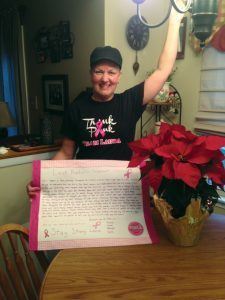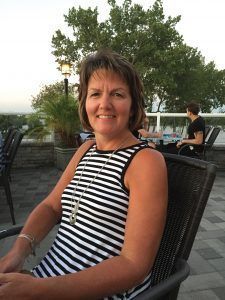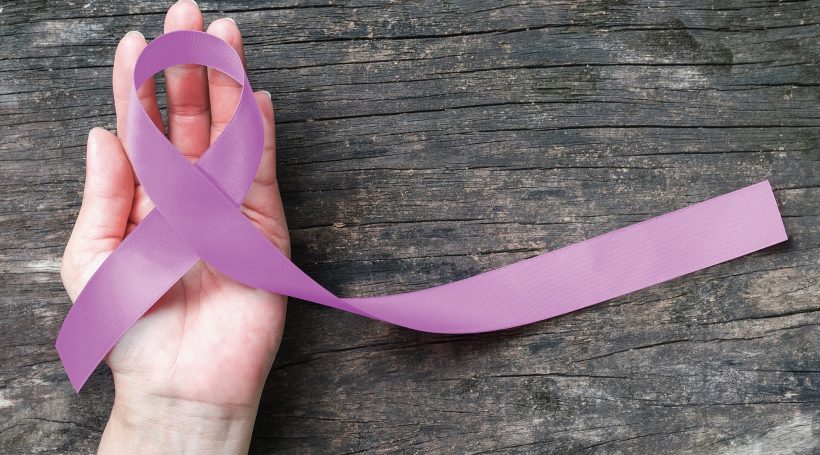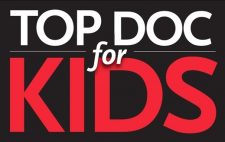When Laura Charboneau of West Deptford was diagnosed with early-stage breast cancer five years ago, she had surgery and radiation, and was told there was a very low risk – only 9 percent – of a recurrence. But despite the low odds, Charboneau felt a lump in her breast last May and soon received a second cancer diagnosis. That began a second round of doctor appointments and treatments, along with another bout of the emotional and psychological distress that accompanies cancer.

Laura Charboneau was diagnosed with cancer twice and underwent two surgeries, four rounds of chemo and 25 radiation treatments
“Your life changes. Your body changes, and it’s all things you don’t have control over,” says Charboneau, 48. “You’re shocked. You’re upset, and you’re grieving.”
Since ending her medical treatments, Charboneau says she tries to stay positive every day, even though life after cancer is definitely different. Sometimes it is difficult not to worry about her health.
“For the most part, I try to put cancer behind me and focus on my family and what I have to do today,” she says. “But the worry is still there when I go for a checkup or a blood test or I have to go for my mammogram. I just try to not let it consume me.”
While many people understand and expect physical changes after a cancer diagnosis, not everyone is prepared for the emotional upheaval – especially when it becomes clear those emotional changes are permanent.
“Getting a cancer diagnosis is always an emotionally tumultuous journey for both the patient and the family,” says Generosa Grana, MD, director of the MD Anderson Cancer Center at Cooper. “A roller coaster of things and emotions happen: you suddenly have a lot of new information that’s not in your normal vocabulary, you’re going on a lot of doctor visits, and you’re trying to do it all while living your normal life and raising your family.”
Grana can speak firsthand about the physical and emotional changes cancer causes, because she is also a breast cancer survivor, having received her diagnosis in 2008. She says her cancer journey helped her gain important insights into her patients’ personal and professional lives.
“I think my diagnosis made me a better physician,” Grana says. “I think it made me more open, more understanding of what the patient is going through: the fear, the impact. I do think it changed me, and I think it changed me for the better.”
More people are surviving cancer today than ever before. Currently, about 14.5 million cancer survivors live in the United States, which is roughly double the number of American cancer survivors in the early 1990s. That number is expected to jump to 19 million by 2024.
Because doctors are treating cancer more aggressively and successfully than in the past, most people who are diagnosed with cancer today have a very different impression of the disease. Doctors say that patients’ attitudes have shifted; instead of associating cancer with a death sentence, they consider it a manageable, survivable disease.
“They don’t talk about, ‘Am I going to die from this,’ but they do talk about it coming back,” says Alexis Harvey, MD, a radiation oncologist at 21st Century Oncology in Willingboro. “They’ll ask, ‘What am I supposed to look for? How will I know the signs?’ It’s the rare patient who has cancer completely leaving their mind.”
Often, it’s well after the end of treatment when a patient will come to terms with what this diagnosis means for their health, their daily existence and their mortality, says Maurice Cairoli, MD, a hematologist-oncologist at Regional Cancer Care Associates in Mount Holly. And even if they’re able to get through everyday life without too much worry, many things can cause sleepless nights and stressful days.
“You heal much more quickly physically than emotionally,” says Cairoli. “It can take many years for patients to compartmentalize the fact that they had cancer and then move on and not have cancer thoughts dominating their lives.”
For many survivors, life never goes back to the way it was before cancer.
“For a good deal of them, there is a new normal,” Harvey says. “They may have muscle and joint discomfort. Those who had hair loss may have found it came in gray and thicker. They may have different stamina. It might be a new you, not necessarily in a bad way, but in a few small ways.”
On a positive side, the things patients used to worry about they usually don’t worry about anymore – which is a good thing, Harvey says.
“Cancer helps people prioritize things,” Grana says. “It can help them make life changes that they now have the fortitude to make. It’s not all negative. A cancer experience can open your eyes to things you hadn’t paid attention to before. Sometimes relationships with loved ones are changed for the better.”
Lee Sargent of Cherry Hill discovered he had early-stage, small-cell lung cancer when he had a routine chest X-ray before an elective surgery in 2014. This past January, after he was finished with his treatments, Sargent says he made a life-altering decision because the diagnosis made him re-evaluate his life.
“I retired from the police department after 45 years,” says Sargent, 66. “Just because of the year-and-a-half of what I went through with cancer, surgery, chemotherapy and radiation, I figured it was time to go enjoy ourselves.”
Sargent’s wife Karen has noticed her husband interacts with family and friends differently since undergoing treatment. “He is much more mellow,” she says. “He’s happier. I think he’s looking at life a little differently. It’s subtle, but he’s enjoying his grandson, family and friends more, just because we have the time. This is definitely a result of his exposure to cancer.”
Cairoli says some patients may experience the exact opposite when it comes to their spouse or loved one.
“For many, it redefines relationships,” he says. “It can lead to divorce. Sometimes it’s the spouse that doesn’t have cancer who makes the decision that this isn’t the life for them. But many cancer patients say, ‘I have to proceed and live my life, and this was a bad marriage. I have to make changes.’ For couples who are already close, this isn’t something that pushes them apart.”
But Grana notes that overwhelmingly, she has seen patients who have finished cancer treatments make more positive than negative changes to their lives.
“It makes you appreciate the here and now,” Grana says. “It makes you appreciate the little things. It makes you take time for some of those things. Some people tell me their priorities really change as they are going through this.”

Laura Charboneau
For Laura Charboneau, she has committed herself to finding time to create happy memories with her family and friends. Before cancer, she might have been less compelled to follow through on things she wanted to do.
“You say in your day-to-day hectic schedule, ‘Let’s plan to go out and have lunch,’ but you don’t always do it,” Charboneau says. “We’ve tried as a family to stick to those commitments, to make those memories, even if it’s just a small memory. Like over Christmas break, my daughter and I kept saying we were going to paint pottery, so we made time and we did it.”
“For cancer patients,” Grana says, “what’s important as they go through this journey is knowing their cancer team is there to help. Cancer programs have social workers and psychologists. We have a whole group of people who work with the cancer physician to deal with the emotional issues patients are going through.” And Grana says those services are available well after treatment ends.
“The key issue for patients and families is to recognize the resources are out there,” Grana adds. “Just let them know you need it. Don’t be silent, because there is help out there.”









